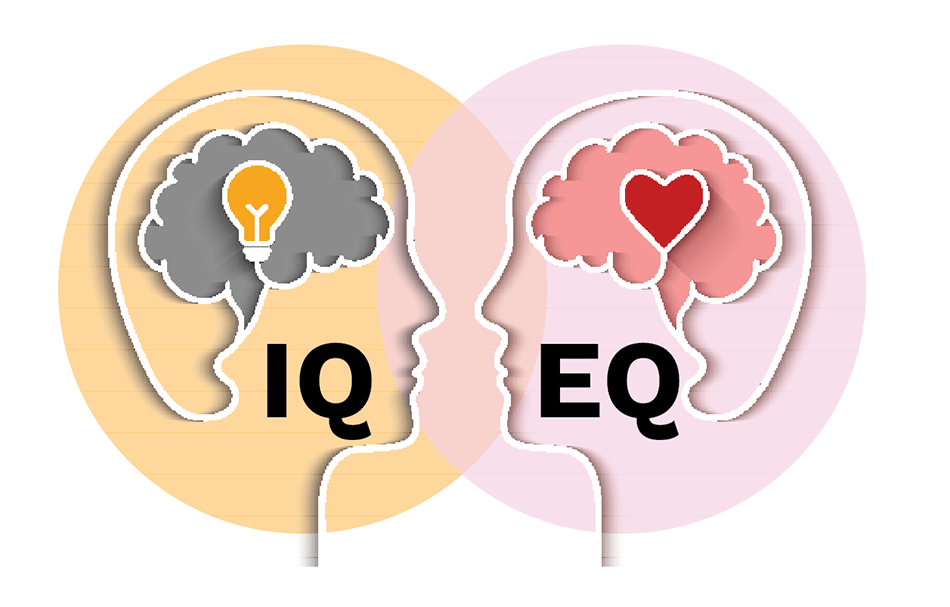Succeeding in today’s world requires a combination of functional, self-management, special knowledge, and technology skills. How relevant is emotional intelligence to this mix?
We are living in very challenging and uncertain times, where people have to be equipped with a strong arsenal of diversified solid psychological tools and skills to be able to navigate through the current unexpected changes of the modern world, especially during the pandemic and all of its consequences in our world.
While speaking about skills, nowadays we not only speak about the vitality of hard skills, such as digital literacy, knowledge in your domain, and tool skills learnt through vocational training designed for tackling job-specific duties but also some “soft” skills like communication and interpersonal skills, emotion management and emotional intelligence skills, which have the utmost power of making you benefit from your relationships, both at work and in your private lives.1
Emotional Intelligence (EQ) is believed to have a number of positive features that have the potential of changing our lives for the better and equipping you with some major soft skills to handle life successfully alongside handling your very own emotions, as well as the emotions of others. These EQ soft skills, in fact, will undoubtedly help you succeed not only in your personal relationships in your private life but also both in academia and in the business sphere.
The term “Emotional Intelligence” (EQ/EI) is very often nowadays used as one of the prerequisites for success.
The term “Emotional Intelligence” has been defined, by Peter Salovey and John Mayer (1990, 1993),2,3 as the ability to monitor one’s own emotions, as well as other people’s emotions, to differentiate between different emotions and label them appropriately, and to use emotional information to guide thinking and behaviour, as well as manage their external outward manifestations in interpersonal communicative interaction.
This definition was later broken down and refined into four proposed abilities of emotional intelligence (EI) by the American psychologist Daniel Goleman in his book “Emotional Intelligence” (1995): perceiving, using, understanding, and managing emotions accordingly.4
Now let us have a closer look at these different but correlated processes, one by one:
1. Perceiving emotions:
The ability to get emotional messages from the outward world and to detect emotions in faces, pictures, voices, and cultural artifacts. This includes not only perceiving the emotions in others but also the ability to identify one’s very own emotions. Perceiving emotions represents a basic and grounding aspect of emotional intelligence, as it makes all other processing of emotional information possible. This is the ability to realise how you feel at this or that very moment of interaction.
2. Using emotions:
The ability to deploy emotions to facilitate various cognitive activities, such as thinking, feeling, communicating, decision-making, and problem-solving activities. The emotionally intelligent person can capitalise fully upon his or her changing moods in order to best fit this or that task at hand. Besides, one can also use his or her very own emotions to have an emotional impact on others through gestures, facial expressions, voice fluctuations, mimics, eye contact, bodily movements, posture, as well as such emotive words and phrases as positive and/or negative intensifiers, etc. that have the power of gaining an emotional influence on the listeners (Rostomyan, 2022).5
3. Understanding emotions:
The ability to comprehend emotive language and to understand the emotions in others to be able to preserve healthy relationships, which also presupposes emotions and feelings. For example, in the process of communication, trying to understand the viewpoint of the other person, his or her intentions, internal motivations, feelings, beliefs, desires, preferences, etc. (Rostomyan, 2020).6 It also involves understanding the slight variations between positive and negative emotions, and the ability to recognise and describe how emotions evolve in interpersonal interaction. This has the potential of helping you build stronger interpersonal relations based on thoughtful appreciation, solid empathy, and genuine trust.
4. Managing emotions:
The ability to regulate emotions in both us and in others. Here, the emotionally intelligent person can tune in with the emotions, even negative ones, and manage them to achieve the intended goals in a particular manner. This also includes managing the expressions of emotions on the verbal and non-verbal levels for harmonious cooperation and communicative conflict reduction while undergoing very strong negative and positive emotions, since they have the greatest potential of influencing our relationship (Rostomyan, 2013).7 At this stage, you can figure out different strategies on how to deploy your emotions to help you achieve a certain goal.
 As we can see from the discussion above, all of these aforementioned EI processes are tightly intertwined and interlinked; they do not exist in separation, so in our everyday life while interacting with one another we are continually experiencing and practicing them, which are the groundings of our emotional experiences that help us understand ourselves, as well as our surrounding world much better, which helps us adjust accordingly.
As we can see from the discussion above, all of these aforementioned EI processes are tightly intertwined and interlinked; they do not exist in separation, so in our everyday life while interacting with one another we are continually experiencing and practicing them, which are the groundings of our emotional experiences that help us understand ourselves, as well as our surrounding world much better, which helps us adjust accordingly.
Nowadays, many scientists and practitioners often speak about the significance of the interrelation of our EQ and IQ, building up our intelligence through our higher cognitive processes, as well as of the benefits of the harmonious flow between therein, as well as the relevance of the concept of WeQ in collective decision making, which also involves the participation of emotions (Rostomyan, Rostomyan, and Ternès 2021).8 As the term “Emotional Intelligence” itself denotes, it includes the notion “intelligence”, which once again comes to prove that emotions can sometimes also be of a rational character and that these two continually interact with one another, providing us with very important pieces of information (Rostomyan 2013, 2022).5,7

As for the different components of Emotional Intelligence, according to Daniel Goleman (1995), they are as follows:4
Self-awareness:
Self-awareness is the ability to recognise one’s very own emotions, emotional triggers, strengths, weaknesses, motivations, values, desires, and goals and to understand how these affect one’s thoughts and behaviour. Being self-aware will also help you in understanding others better and acting accordingly. To raise your emotional self-awareness, it is recommended to reflect on your behaviour and your feelings from aside to understand why you are feeling or acting in this or that way, because when you understand the cause, half of the problem will be solved. Truly, if you are self-aware, you can be more at peace with yourself and your surroundings.
Self-regulation:
Self-regulation is the ability to regulate and manage the internal and external manifestations of one’s own emotions. Everyone – including those with a high EQ – sometimes experience bad moods and negative emotions like anger, sadness, and stress, but self-management is the ability to gain cognitive control over these emotions rather than having them control you. Self-management involves mental, psychological, as well as verbal and non-verbal levels of managing the expressions of emotions in your interactions. When experiencing very strong negative emotions, one piece of advice can be to calm down before responding to that negative emotional trigger e.g. by counting to ten before reacting. Yet this does not mean that you always must inhibit or suppress your negative emotions. Sometimes you have to let them flow and build relationships accordingly not to harm your internal psychological state by always suppressing them, since they can also be constructive in establishing and building strong relationships with your partners, both in business and in private.
Motivation:

Motivation is essentially what moves us towards taking action in this situation or another. When we face setbacks and obstacles, checking in with our motives is what inspires us to keep pushing forward and not stop. Sometimes outward impulses may motivate us, e.g. seeing someone succeed, and sometimes our internal emotional impulses, e.g. aspiration, inspiration, will, longing, and desire to succeed, etc. can also motivate us towards achievement and success. To keep you motivated, you can remember all the successes and achievements that you have had so far or have a role model whom you’d wish to take after. Motivation is the driving force of ours towards accomplishments and we should not get demotivated by failures, since, as they say, “Failure is a step towards success” both in our personal and professional lives.
Empathy:
Empathy is the ability to connect emotionally with others and take into consideration their emotions, feelings, concerns, doubts, aspirations and points of view. Empathy is the highest form of emotional intelligence, where you tune in with the other’s emotions, “feel yourself in the other’s shoes” and build your actions upon those experiences. Empathy is also essential for team harmony. Noticing and responding to the emotional needs of the people you work with makes up for a happy and satisfied work culture. To raise your empathetic skills, you can try to feel in the skin of the other when trying to understand their behaviour and actions. This can also result in compassion towards others through feeling and understanding their emotions, where you not only understand their emotions but also take action towards lending them a helping hand.
Social Skills:
Under the EQ skill component of social skills, we understand how we manage our relations in our lives. Relationship management is all about interpersonal skills, that is, one’s ability to build genuine trust, rapport, connection, and respect with your peers, relatives, friends, neighbours, partners, and colleagues. Truly, when interacting with one another, we have to be skillful emotions readers to be able to build long-lasting and harmonious interpersonal relations, which will strengthen our relationship management skills. Therefore, while trying to build a long-lasting trustworthy relationship, it is highly recommended to pay attention to others’ emotions and feelings as well. This will resultantly also be a groundbreaking milestone towards success and achievement both in personal and professional life (Rostomyan, 2022a).1
All the aforementioned EQ skills are, in fact, very important “soft skills” vitally crucial in handling life, as well as promoting us towards achievement and eventual success, closely interrelated to and intertwined with one another, ensuring and giving value to our peaceful and enjoyable success in our lives both in private and professionally (Rostomyan, 2022a).5
Thence, in case we are aware of these aforementioned processes, we will be more apt in reading emotions and dealing with them accordingly.
Conclusion
 In life, we almost always experience some sort of emotion or feeling. Moreover, our emotional state may vary throughout the whole day. Therefore, we need some soft skills to handle life efficiently and to succeed in it by achieving our goals accordingly.
In life, we almost always experience some sort of emotion or feeling. Moreover, our emotional state may vary throughout the whole day. Therefore, we need some soft skills to handle life efficiently and to succeed in it by achieving our goals accordingly.
The discussed EQ skills above are the main pillars in one’s emotional intelligence, which is sometimes even considered to be much more important and helpful in achievements than one’s IQ is in handling stressful life situations.
In today’s digitalised and globalised world, there is a need for soft skills to be able to deal with the challenges that the world imposes on us, especially in terms of artificial intelligence (AI). Even AI machines are getting equipped with EQ skills to better cooperate and interact with humans, making human-machine interactions much more enjoyable.
To sum up, although emotional intelligence seems to come naturally to some of us, our brain’s plasticity means we can indeed increase our emotional intelligence with the discussed soft skills, through training, with the help of which we will be able to become more skillful and proficient communicators, as well as successful interactants and achievers in life.
This article was originally published on 25 June 2023.
About the Author
 Dr. Anna Rostomyan is a Professor, EQ Coach, international Author, and Lecturer at the Berlin School of Business and Innovation (BSBI). She defended her PhD excellently in collaboration with the University of Fribourg (Switzerland) and Yerevan State University (Armenia). She is the author of five books and 30 publications worldwide with readers from around 100 nationalities.
Dr. Anna Rostomyan is a Professor, EQ Coach, international Author, and Lecturer at the Berlin School of Business and Innovation (BSBI). She defended her PhD excellently in collaboration with the University of Fribourg (Switzerland) and Yerevan State University (Armenia). She is the author of five books and 30 publications worldwide with readers from around 100 nationalities.
References
- Rostomyan, Anna (2022a). Emotional Intelligence as an Essential Soft Skill for Success. Proceedings of the First International Scientific and Practical Internet Conference called “Importance of Soft Skills for Life and Scientific Success”, Dnipro, Ukraine.
- Salovey, P. & Mayer, J. (1990). Emotional Intelligence. Imagination, Cognition and Personality, 9(3), pp. 185–211.
- Salovey, P. & Mayer, J. (1993). The Intelligence of Emotional Intelligence. Intelligence, 17 (4), pp. 433–442.
- Goleman, Daniel (1995). Emotional Intelligence. New York, Toronto, London, Sydney, Auckland: Bantam Books.
- Rostomyan, Anna (2022b). The Ultimate Force of Emotions in Communication: A Linguo-cognitive Analysis of Verbal and Non-verbal Expressions of Emotions (on the material of English). Dissertation, Yerevan State University, 2013, Dȕren: Shaker Verlag.
- Rostomyan, Anna (2020). Business Communication Management: The Key to Emotional Experience. Hamburg: Tredition Publications.
- Rostomyan, Anna (2013) Management Techniques of Emotions in Communicative Conflict Reduction, in part 3: Communication and Management, Communication: Breakdowns and Breakthroughs, Probing the Boundaries, eds. Anabel Ternès, Inter-disciplinary Press, UK: Oxford, pp. 141-151.
- Rostomyan, A.A., Rostomyan, A.M. and A. Ternès von Hattburg (2021). The Significance of Emotional Intelligence in Business. International Business and Economics Studies Journal, 3(3), LA: Scholink Publications, Available at: http://www.scholink.org/ojs/index.php/ibes.









